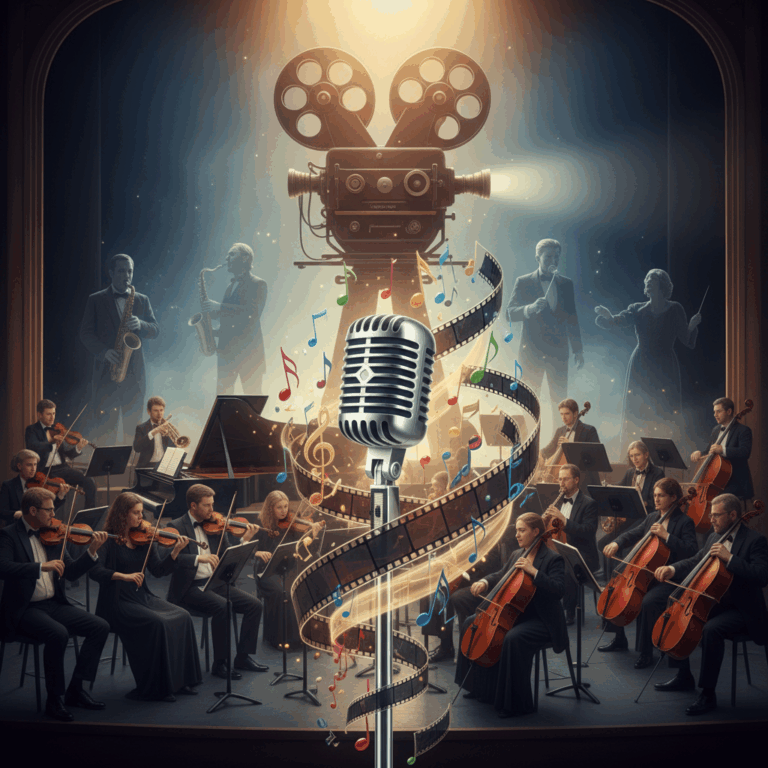Importance of songs in cinema
Songs in cinema not only complement the visual narrative, but become a vital element to connect with the public on an emotional and cultural level.
These musical pieces manage to transcend the screen, transforming into symbols that represent eras, feelings and social movements over time.
Its impact is not limited to art, but also influences the commercial industry, positioning itself as global successes that accompany the success of films.
Cultural and commercial impact
Iconic film songs reflect and shape popular culture, becoming generational anthems that express collective ideals and emotions.
In addition, they generate a considerable economic impact by extending beyond the film, being sold, covered and broadcast in different media worldwide.
Its international recognition increases the visibility of films and their artists, consolidating careers and strengthening the music and film industry.
Representation of emotions and iconic moments
Songs in film capture the emotional essence of key scenes, reinforcing the message and atmosphere that directors wish to convey.
These melodies are associated with unforgettable moments, remaining recorded in the collective memory as symbols of hope, love or struggle.
This power of evocation turns the songs into indirect protagonists that enrich the viewer's experience and last over time.
Classic songs and their legacy
Classic film songs have marked generations and continue to inspire with their emotional power and symbolic meaning within stories.
These melodies not only accompany iconic scenes but also represent universal values, becoming permanent cultural references.
Their legacy is reflected in the influence they have on contemporary music and the way they continue to be performed and remembered worldwide.
ÉSomewhere over the Rainbow armband and its symbolism
This iconic song from The Wizard of Oz symbolizes hope and dreams to achieve, masterfully performed by Judy Garland.
It is recognized by the American Film Institute as the best song in the history of cinema, connecting with the public on a deep emotional level.
Its optimistic message has transcended generations, becoming an anthem that invites us to believe in a better world and the possibility of changing reality.
ÎAs Time Goes By fuente and its significance
Original from Everybody's Welcome, this song achieved global fame thanks to Casablanca, especially in Rick's bar scene.
Its timeless melody connects with deep themes such as love and the passage of time, which explains its durability in popular culture.
Although it was composed for a different musical, its inclusion in Casablanca elevated it as a romantic and nostalgic symbol of the time.
ÎMoon River fren and her role in musicals
Played by Audrey Hepburn in Breakfast at Tiffany's, this ballad by Mercer and Mancini became an icon of musical cinema.
The scene on the balcony that presents it is one of the most remembered, despite the fact that it was almost eliminated from the final cut.
His melodic and soft style provides an intimate tone that perfectly complements the character's narrative and the atmosphere of the film.
ÉSSinging in the Rain, the golden era of musical cinema
This classic defines the golden age of musical cinema with a celebration of joy and spectacle performed by Gene Kelly.
The song and its iconic scene in the rain represent the enthusiasm and magic of classic cinema, symbolizing optimism and talent.
His influence transcends the screen, being a constant reference in the musical genre and global popular culture.
Emblematic songs of the modern era
The songs of the modern era in cinema have marked a new stage where music merges with contemporary narratives.
These compositions not only elevate the audiovisual experience, but also achieve a significant cultural and commercial impact on a global level.
Its popularity reflects how music remains fundamental in defining key moments in the seventh art.
ÎMy Heart Will Go On arse and the Titanic phenomenon
ÎMy Heart Will Go On In Fuel, performed by Celine Dion, became an iconic ballad that accompanied Titanic's worldwide success.
The song encapsulates the tragedy and love between the protagonists, standing out as the only single from the soundtrack with great commercial impact.
Its powerful melody and lyrics managed to connect emotionally with audiences of all ages, consolidating it as a modern icon.
ésStaying Alive arban and disco music in the cinema
ÎStaying Alive from The Bee Gees was key in Saturday Night Fever, representing the essence of the disco era with its energetic rhythm.
This song not only promoted the film but defined a musical genre, becoming a cultural symbol of the 70s.
Its catchy melody accompanied one of the most memorable dance scenes, elevating its status within film and music.
ÀThe Way We Were arson and recognition in awards
The Way We Were, performed by Barbra Streisand, won the Oscar for Best Original Song thanks to its emotional composition.
The song reflects the complexity of a love relationship, in perfect harmony with the nostalgic theme of the film.
Its international and award success consolidated it as a recognized ballad that transcends the cinematographic context.
Songs that defined genres and artists
'The Cycle of Life' became a powerful anthem in The Lion King, marking a before and after on the soundtracks of animated films.
This song stands out for its emotional charge and for integrating African cultural elements, offering a unique and memorable sound experience.
Its impact not only strengthened the narrative, but also inspired future productions encouraged to opt for quality original compositions.
ÎleThe Cycle of Life, the influence and influence on animated films
Composed by Elton John and Tim Rice, The Lion King opens strongly in the film's epic and mythical tone.
The song combines traditional and modern rhythms, contributing to the viewer's immersion in the film's African environment.
Although nominated for an Oscar, she stood out for her emotional resonance and her essential role in popularizing animated music as a serious art.
Its narrative and musical power has influenced other productions, showing that music can elaborate universes and deepen the plot.
ieEye of the Tiger armband and its link with sport and motivation
ÎEye of the Tiger arren is synonymous with strength and perseverance thanks to its use in Rocky III, where it drives the story of self-improvement.
The song was chosen after rejecting another piece, and has since been a motivational classic in both film and sports.
Its energetic rhythm and inspiring lyrics have made this song an anthem for athletes and people seeking to improve themselves every day.






